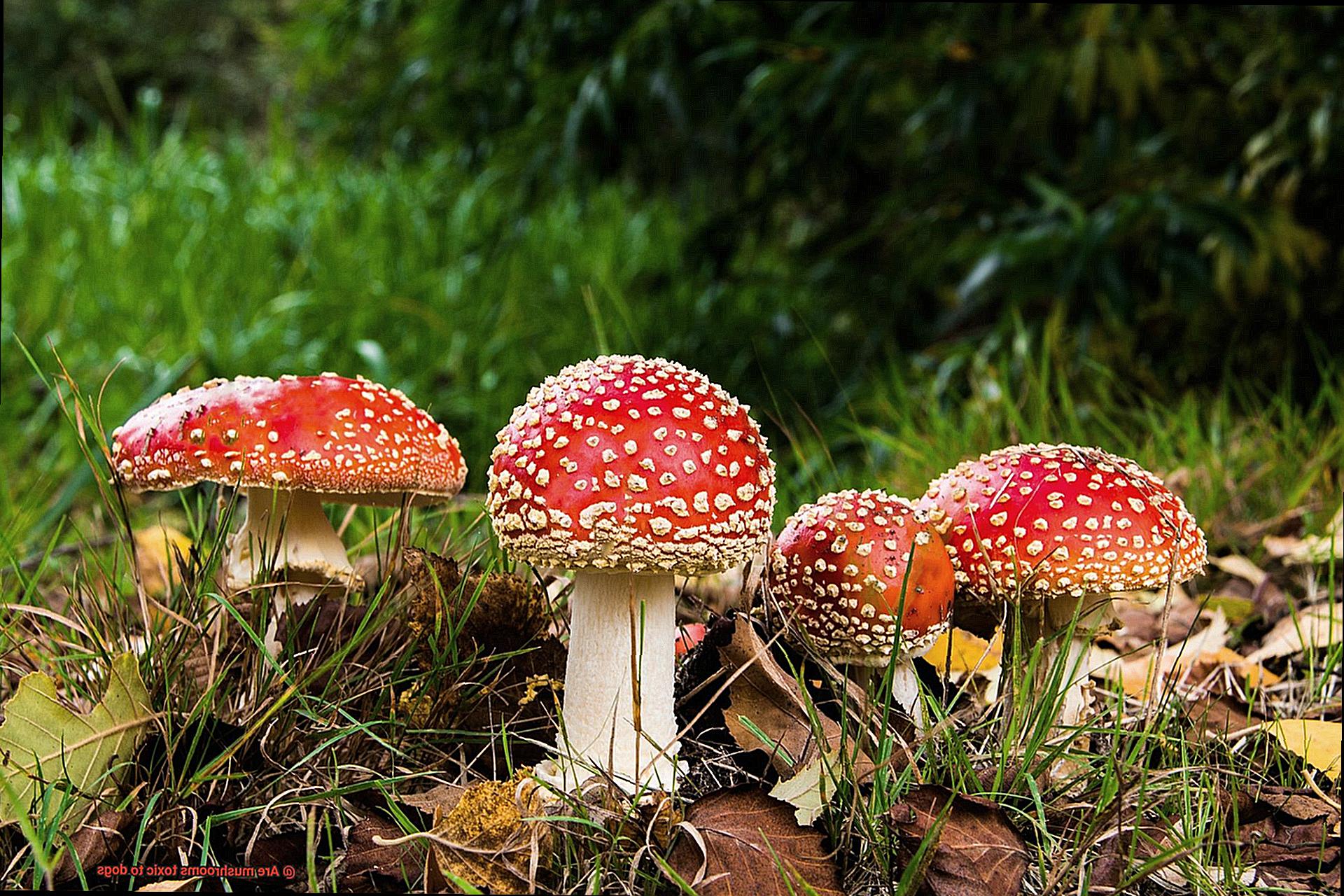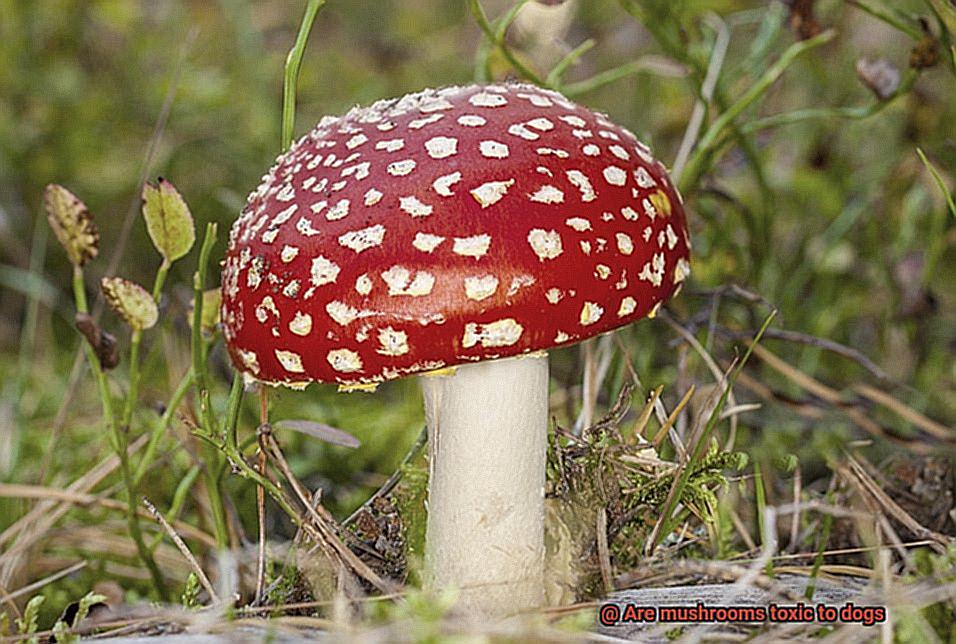Are mushrooms toxic to dogs?
Welcome to our blog, where we unravel the mysteries surrounding our furry friends. Today, we’re diving headfirst into an enchanting topic – mushrooms. 🍄 But hold your horses, because beneath their whimsical allure lies a hidden danger for our four-legged companions.
Ever wondered if those colorful toadstools popping up in your backyard could pose a threat to your pup’s health? Or maybe you’ve caught Fido nibbling on a wild mushroom during your afternoon stroll, leaving you both amazed and concerned. Fear not, because in this post, we’ll explore whether mushrooms are toxic to dogs and give you all the info every pet parent needs.
Get ready to be captivated by a world where mighty fungi reign supreme, boasting an array of shapes, sizes, colors, and even unique hallucinogenic properties. But amidst the intrigue, we’ll also uncover the dark side that may lurk within mushrooms. Some species possess toxins that can lead to severe health complications for our furry pals.
So buckle up and join us as we venture into this captivating world. We’ll demystify the potential risks and arm ourselves with knowledge to keep our fur babies safe. It’s time to separate fact from fiction and empower ourselves with the truth about mushrooms’ impact on our beloved dogs. 🐶✨
Types of Toxic Mushrooms for Dogs
Contents
- 1 Types of Toxic Mushrooms for Dogs
- 2 Signs and Symptoms of Mushroom Poisoning in Dogs
- 3 What to Do if Your Dog Ingests a Toxic Mushroom
- 4 Treatment for Mushroom Poisoning in Dogs
- 5 Preventative Measures for Dog Owners
- 6 Common Wild Mushrooms That Are Toxic to Dogs
- 7 How Size and Health Affect Toxicity Levels in Dogs
- 8 Educating Yourself About Mushrooms and Their Potential Toxicity
- 9 Conclusion
French Bulldogs are playful and curious companions, always ready for an adventure. However, their inquisitive nature can sometimes lead them into dangerous situations, especially when it comes to mushrooms. While some mushrooms are harmless, others can be highly toxic and even fatal for our four-legged friends. In this article, we will explore the different types of toxic mushrooms that French Bulldogs should avoid.
Amanita Muscaria (Fly Agaric):
With its iconic red cap adorned with white spots, the Amanita Muscaria may look like something out of a fairy tale. However, this mushroom is far from magical for our French Bulldogs. Consumption of this mushroom can lead to severe gastrointestinal upset, liver damage, and even death in dogs. It’s important to keep a close eye on your furry friend during outdoor adventures to prevent them from ingesting this dangerous fungus.
Amanita Phalloides (Death Cap):
The Amanita Phalloides, also known as the Death Cap, lives up to its sinister reputation by being one of the deadliest mushrooms for both humans and dogs. Its appearance may vary, but it typically has a greenish-yellow cap and white gills. Ingesting this mushroom can cause liver failure and other life-threatening complications in French Bulldogs. Remember, looks can be deceiving, so always be cautious when exploring new areas with your furry friend.
Gyromitra Esculenta (False Morel):
Springtime brings beautiful blooms and the emergence of the False Morel mushroom, also known as Gyromitra Esculenta. With its wrinkled cap in shades of reddish-brown to yellow, it may seem intriguing to French Bulldogs. However, ingesting this mushroom can result in vomiting, diarrhea, seizures, and even coma. Keep a watchful eye on your furry friend during your outdoor adventures to ensure their safety.
Galerina Marginata (Deadly Galerina):
Small and brown, the Galerina Marginata is often mistaken for edible mushrooms. However, this deadly fungus can wreak havoc on a French Bulldog’s liver. Growing on decaying wood or in damp areas, ingestion of this mushroom can lead to severe liver damage and potentially be fatal if not treated promptly. Take extra precautions when exploring wooded areas to protect your furry friend.
Cortinarius Species:
The Cortinarius species encompasses a wide range of mushrooms found in forests and woodland areas. These mushrooms come in various colors and shapes, making them difficult to identify. Many species within this group contain toxins that can cause kidney failure in French Bulldogs. Stay vigilant during outdoor excursions to prevent accidental ingestion of these toxic mushrooms.
Conclusion:
As responsible pet owners, it is crucial to protect our French Bulldogs from the dangers of toxic mushrooms.
Signs and Symptoms of Mushroom Poisoning in Dogs
French Bulldogs, with their playful and curious nature, are always up for an adventure. However, their inquisitiveness can sometimes lead them into dangerous situations, such as encountering toxic mushrooms. These fungi can be fatal if ingested by our furry friends. To ensure the well-being of our beloved French Bulldogs, it is crucial to be vigilant and knowledgeable about the signs and symptoms of mushroom poisoning.
Signs and Symptoms of Mushroom Poisoning in Dogs:
Mushroom poisoning can manifest differently depending on the type of mushroom ingested. Here are some common signs and symptoms to watch out for:
- Vomiting
- Diarrhea
- Excessive drooling
- Tenderness or pain in the belly area
- Hunched posture
- Restlessness
- Refusal to eat or drink
- Decreased activity levels
- Unusual tiredness

- Weakness or lack of coordination
- Tremors or seizures
- Disorientation or confusion
- Liver failure
- Kidney damage
- Coma
The onset and severity of these symptoms can vary depending on factors such as the type and amount of mushroom ingested, as well as the individual dog’s size and overall health.
Why Immediate Veterinary Care is Crucial:
If you suspect your French Bulldog has ingested mushrooms and is exhibiting any signs or symptoms of poisoning, it is imperative to seek immediate veterinary care. Delaying treatment can have severe consequences for your furry companion.
When you contact your veterinarian, they may ask questions regarding the type and amount of mushroom ingested, as well as the time of ingestion. This information will assist them in determining the appropriate course of action.
Treatment and Supportive Care:
The veterinarian may recommend inducing vomiting or administering activated charcoal to prevent further absorption of toxins. Additionally, supportive care such as intravenous fluids, anti-nausea medications, and monitoring of organ function may be necessary.
What to Do if Your Dog Ingests a Toxic Mushroom
You and your French Bulldog are out on a lovely walk, enjoying the fresh air and beautiful surroundings. Suddenly, your pup sniffs out something interesting on the ground and takes a curious nibble. Little did you know, that innocent-looking mushroom your dog just ingested could be toxic. Time is of the essence when it comes to mushroom poisoning in dogs, so let’s dive into what you need to do if this happens to your furry friend.
Signs and Symptoms:
The first step in dealing with mushroom poisoning is recognizing the signs and symptoms. Keep an eye out for vomiting, diarrhea, drooling, abdominal pain, weakness, tremors, seizures, or even coma in severe cases. Remember, symptoms can vary depending on the type of mushroom ingested.
Call the Vet:
If you suspect your French Bulldog has ingested a toxic mushroom, don’t waste any time and call your veterinarian immediately. They will provide you with the necessary guidance based on their expertise. If it’s after hours, have the contact information for an emergency vet clinic or poison control hotline readily available.
Collect Information:
While waiting for professional advice, gather as much information as possible about the mushroom your dog ingested. Take a clear photo of the mushroom (if possible), noting its color, shape, size, and any distinctive features. This information will help your veterinarian identify the specific species and determine appropriate treatment.
Inducing Vomiting (Only Under Professional Guidance):
Inducing vomiting may be recommended by your vet or poison control center in some cases. However, never attempt to induce vomiting without proper guidance from a professional. Certain toxins can cause more harm if vomited back up, so it’s crucial to follow their instructions carefully.
Do Not Use Home Remedies:
While it may be tempting to try home remedies, it’s important to resist the urge. Milk, saltwater, or activated charcoal can actually worsen the situation or interfere with subsequent medical interventions. Trust your veterinarian’s expertise and follow their instructions closely.
Monitor Closely:
Even if your French Bulldog isn’t showing immediate symptoms, keep a close eye on them. Symptoms may take hours to appear, so watch for any changes in behavior or physical symptoms. Report any concerns to your veterinarian promptly.
Treatment at the Vet:
Once you reach the veterinarian, they will provide appropriate treatment based on the specific mushroom ingested. Treatment may involve supportive care, such as intravenous fluids, activated charcoal to absorb toxins, medications to control symptoms, and monitoring vital signs. In severe cases, hospitalization may be necessary.
Prevention is Key:
Remember, prevention is always better than cure. Keep your yard free of mushrooms by regularly removing them and discourage your French Bulldog from foraging or eating unknown items during walks. Educate yourself about the potential danger of wild mushrooms and remain vigilant.
Treatment for Mushroom Poisoning in Dogs
French Bulldogs are known for their playful and curious nature, making them more susceptible to mushroom poisoning. If you suspect that your French Bulldog has ingested toxic mushrooms, it is crucial to seek immediate veterinary assistance. In this article, we will provide you with an expert overview of the various treatment options for mushroom poisoning in dogs, specifically tailored for French Bulldogs.
Contact a Veterinarian Immediately
The first step in treating mushroom poisoning is to contact a veterinarian as soon as possible. They will be able to provide guidance on what steps to take next based on the type of mushroom ingested and the severity of symptoms.
Remove Mushrooms from the Environment
To prevent further ingestion, it is important to remove any remaining mushrooms from your dog’s environment. This includes your yard, walking routes, and any other areas where your French Bulldog may have access to mushrooms.
Inducing Vomiting (Under Veterinary Guidance)
In some cases, inducing vomiting may be recommended to remove any remaining mushrooms from your dog’s stomach. However, this should only be done under the guidance of a veterinarian as it can be dangerous in certain circumstances.
Administration of Activated Charcoal
To absorb any toxins still present in your dog’s system, activated charcoal may be administered. This helps prevent further absorption of toxins into the bloodstream.
Supportive Care and Hospitalization (if necessary)
In severe cases, hospitalization may be required for supportive care. This can include intravenous fluids to maintain hydration, medications to control symptoms such as vomiting or diarrhea, and monitoring of vital signs.
Blood Tests and Monitoring
Blood tests may be conducted to assess liver and kidney function and monitor for any potential complications. Close monitoring of your French Bulldog’s progress during recovery is essential.
Antidotes (if available)
In some cases, specific antidotes may be available for certain types of mushroom poisoning. These antidotes work by neutralizing the toxins and can be life-saving in some situations.
Remember, prevention is key when it comes to mushroom poisoning. Keep your French Bulldog away from areas where mushrooms grow and be vigilant during walks or hikes. Always consult a veterinarian if you suspect mushroom ingestion, as early intervention is crucial for a successful outcome.
Preventative Measures for Dog Owners
French Bulldogs are beloved companions known for their playful and curious nature. However, their adventurous spirit can put them at risk of mushroom poisoning. As a responsible dog owner, it’s essential to take preventative measures to ensure the safety and well-being of your furry friend. In this article, we’ll explore seven practical steps you can take to protect your French Bulldog from mushroom poisoning.
Educate Yourself:
Start by familiarizing yourself with the types of mushrooms that grow in your area and their potential toxicity to dogs. Learn to identify common poisonous mushrooms and their distinguishing features. This knowledge will empower you to recognize and avoid them during walks or outdoor activities.
Supervise Outdoor Activities:
Always keep a watchful eye on your French Bulldog during outdoor adventures. Dogs are naturally curious and may be attracted to mushrooms, especially if they smell enticing or resemble edible treats. Stay vigilant and discourage your dog from investigating or consuming any unidentified objects.
Maintain a Well-Groomed Yard:
If you have a backyard, ensure it is well-maintained and free of potential mushroom growth. Regularly remove fallen leaves, decaying wood, or other organic matter that may harbor mushrooms. By keeping your yard clean, you minimize the risk of your dog coming into contact with toxic varieties.
Secure Garbage Bins:
Dogs are notorious scavengers and may be tempted to rummage through garbage bins, where they could find discarded food scraps or mushroom remnants. Prevent accidental ingestion by ensuring your garbage bins are securely closed or stored in areas inaccessible to your dog.
Training and Obedience:
Teach your French Bulldog basic commands like “leave it” or “drop it.” These commands come in handy when you notice your dog showing interest in mushrooms. With proper training, you can redirect their attention away from mushrooms and discourage them from picking up or consuming any potentially harmful fungi.
Regular Veterinary Check-Ups:
Maintain regular visits to your veterinarian to ensure your French Bulldog’s overall health and well-being. Discuss any concerns you may have regarding mushroom toxicity and seek professional advice. Your vet can provide specific guidance based on your dog’s breed, age, and individual health status.
Stay Informed about Local Risks:
Mushroom toxicity can vary depending on geographical location and climate. Stay informed about any local reports or alerts related to poisonous mushrooms in your area. Consult local veterinary clinics, animal control agencies, or online resources for valuable information. By staying updated, you can take necessary precautions and keep your dog safe.
Common Wild Mushrooms That Are Toxic to Dogs
When it comes to keeping our four-legged friends safe, it’s essential to be aware of the potential dangers lurking in our environment. One such hazard is wild mushrooms, which can pose a serious threat to our beloved dogs, including French Bulldogs. In this section, we will explore some common wild mushrooms that are toxic to dogs and discuss the importance of keeping our furry companions away from them.
Wild mushrooms come in various shapes, sizes, and colors, making it challenging to distinguish between the edible ones and the toxic ones. While most wild mushrooms are harmless, there are several species that can have severe consequences if ingested by dogs. It’s crucial for dog owners to be able to identify these toxic mushrooms to prevent accidental ingestion.
Amanita Species (Death Cap, Destroying Angel):
- Appearance: These mushrooms have a white or yellowish cap with white gills and a bulbous base.
- Habitat: They are commonly found in wooded areas and near oak or pine trees.
- Toxins: Amanita species contain amatoxins, which can lead to severe liver and kidney damage.
Gyromitra Species (False Morels):
- Appearance: False Morels have a brain-like or saddle-shaped cap with a wrinkled surface.
- Habitat: They are often found in forested areas or near decaying wood.
- Toxins: Gyromitra species contain gyromitrin, which can cause gastrointestinal upset and liver toxicity.
Galerina Species (Deadly Galerina):
- Appearance: Deadly Galerina mushrooms have rusty brown caps with brown gills.
- Habitat: They typically grow on decaying wood or tree stumps.
- Toxins: Galerina species contain amatoxins, similar to Amanita mushrooms, and can cause liver damage and organ failure.
Symptoms and Dangers:
If a dog ingests any of these toxic mushrooms, they may experience symptoms such as vomiting, diarrhea, abdominal pain, jaundice, lethargy, seizures, and even death. It’s crucial to seek immediate veterinary care if you suspect your dog has ingested a toxic mushroom.
Prevention is Key:
To protect our furry friends from toxic mushrooms, it’s essential to take preventive measures. Keep your dog leashed during walks to prevent them from foraging in areas with wild mushrooms. Avoid known mushroom growth areas and train your dog to avoid eating anything they find on the ground. Additionally, be cautious of backyard mushrooms and ensure you can identify them before allowing your dog near them.
How Size and Health Affect Toxicity Levels in Dogs
Today, we’re going to explore an important topic that concerns the well-being of our furry friends – how size and health affect the toxicity levels of mushrooms in dogs. As experts in canine health, we understand the unique challenges that French Bulldogs face, and aim to provide you with valuable insights to keep your canine companion safe.
Size Matters:
French Bulldogs are small in size, making them more susceptible to the toxic effects of mushrooms compared to larger breeds. Due to their lower body weight and metabolism, even a small amount of mushroom ingestion can have a greater impact on their system. This emphasizes the importance of being vigilant and proactive when it comes to preventing mushroom exposure for your French Bulldog.
Health Conditions:
The health condition of your French Bulldog also plays a crucial role in determining their vulnerability to mushroom toxicity. Dogs with pre-existing health issues, such as liver or kidney problems, may be more at risk. These organs are responsible for filtering out toxins from the body, and if they’re already compromised, it can impair their ability to eliminate toxins efficiently. Therefore, it’s essential to consider your dog’s overall health before exposing them to potential mushroom hazards.
Types of Toxic Mushrooms:
Certain species of mushrooms contain highly toxic substances that can cause severe illness or even death in dogs. Regardless of size or health, these mushrooms pose a significant threat. As responsible pet owners, it’s crucial to familiarize ourselves with the specific types of mushrooms that are known to be toxic to dogs and ensure they are avoided at all costs.
Prevention is Key:
To protect your French Bulldog from mushroom-related dangers, it’s best to adopt a proactive approach. Here are some preventive measures you can take:
- Familiarize yourself with toxic mushrooms: Educate yourself about the various types of toxic mushrooms that are prevalent in your area. This knowledge will help you identify and avoid potential risks.
- Keep your yard mushroom-free: Regularly inspect your yard for any mushrooms and promptly remove them. Remember, even seemingly harmless mushrooms can be dangerous for your French Bulldog.
- Leash control during walks: When exploring wooded areas or parks, keep your French Bulldog on a leash to prevent them from foraging on potentially toxic mushrooms.
- Seek immediate veterinary attention: If accidental ingestion occurs, don’t hesitate to seek immediate veterinary care. Your veterinarian will assess the situation, identify the type of mushroom ingested, and provide appropriate treatment tailored to your French Bulldog’s size, health condition, and symptoms.
Educating Yourself About Mushrooms and Their Potential Toxicity
These adorable companions may be small in size, but they are big on curiosity, making them more vulnerable to the dangers lurking in our environment. In this blog post, I will share my expertise and provide valuable insights to help you keep your French Bulldog safe from mushroom-related harm.
The Curiosity Factor:
French Bulldogs are known for their curious nature, which can lead them to explore their surroundings and potentially encounter mushrooms. It’s crucial to understand that not all mushrooms are safe for dogs, and identifying toxic species can be challenging even for experienced dog owners. Visual identification alone is not enough, as poisonous mushrooms can resemble harmless ones. Therefore, it’s essential to adopt a “better safe than sorry” mindset and prevent your furry friend from ingesting any wild mushrooms.
Prevention Is Key:
Minimize the risk of mushroom toxicity by ensuring your dog’s environment is free from mushrooms. Regularly inspect your yard or garden and promptly remove any mushrooms that may have sprouted. When taking your French Bulldog for walks in areas where wild mushrooms are prevalent, keep them on a leash and avoid areas where mushrooms are growing. Remember, prevention is always better than treatment when it comes to mushroom toxicity.
Knowing the Signs:
Familiarize yourself with the signs and symptoms of mushroom poisoning in dogs. These may include vomiting, diarrhea, abdominal pain, drooling, weakness, tremors, and seizures. If you suspect your French Bulldog has ingested a toxic mushroom, don’t hesitate—seek immediate veterinary attention. Time is of the essence when it comes to treating mushroom toxicity, and early intervention can save your furry friend’s life.
RvRqDeRf98Y” >
Conclusion
In conclusion, it is crucial to understand that mushrooms can indeed be toxic to dogs.
These seemingly innocent fungi can hide a dangerous secret, containing toxins that can wreak havoc on our furry friends’ bodies. As responsible pet owners, we must be vigilant and ensure that our dogs are kept away from wild mushrooms during walks or playtime in the yard.
Remember, prevention is key when it comes to protecting our beloved companions from potential harm. If you suspect your dog has ingested mushrooms or is showing any signs of toxicity, don’t hesitate to contact your veterinarian immediately.
Their expertise and prompt action could save your dog’s life.




